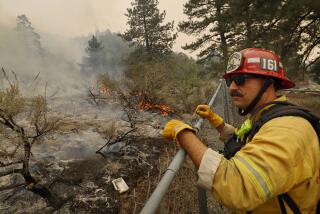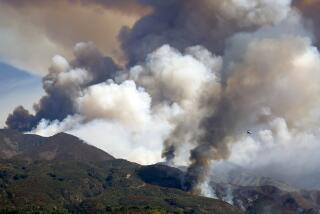Drought sparks larger wildfires throughout California
- Share via
Firefighters are tackling larger and more aggressive wildfires as drought conditions continue for a fifth year in California, drying out swaths of forest land.
Raging wildfires in Northern and Southern California kept firefighters busy over the weekend, pushing the number of acres burned so far this year to well over 20,000.
In the north, crews tackled the 3,200-acre Coleman fire as it tore through Los Padres National Forest, threatening several homes. Farther south in Calabasas, residents left their homes as flames consumed more than 500 acres. Fast-approaching flames forced a bride, groom and their guests to act quickly and move their entire wedding at the Inn of the Seventh Ray in Topanga Canyon to a nearby beach.
“Now already this year, crews have responded to 1,562 wildfires that have burned nearly 28,000 acres,” said Daniel Berlant, spokesman for the California Department of Forestry and Fire Protection.
That’s twice as many acres burned for the first six months this year than in 2015, he said. According to Cal Fire, 11,353 acres burned for the same period in 2015.
A Southland heat wave created treacherous conditions for firefighters tackling the Old fire in the hills of Calabasas during the weekend, when temperatures were 10 to 20 degrees higher than average in many areas, according National Weather Service meteorologist Joe Sirard.
Fire officials expect heat conditions to worsen during the summer across the state, as moisture levels drop quickly in timber and grass.
In Central California, heavier rainfall during the winter resulted in a larger grass crop. The largest fire risk is in the Sierra Nevada foothills where 29 million trees are dying and infested with bark beetles.
That’s bad news for the Central Valley, which could see a more active fire season, according to a seasonal outlook from the National Interagency Fire Center.
“Much of California is now entering a fifth year of drought, and while rainfall this past winter was more than in recent years, it was ineffective in reducing drought severity across the central portions of the state,” according the fire agency’s fuels and fire assessment.
Normally tree mortality in the southern and central Sierra Nevada is less than 5%. But tree death substantially increased last year, with some forests seeing up to 100% mortality.
According to the assessment, “extreme fire behavior such as dangerous rates of spread (similar to what was observed on the Rough, Valley, and Butte fires last year), torching, crowning, and long range spotting can be expected.”
The Rough fire scorched 151,623 acres in Kings Canyon National Park and the Sequoia and Sierra national forests.
The deadly Valley and Butte fires wrecked several Northern California communities.
The Valley fire charred 76,067 acres in Napa, Lake and Sonoma counties, killing four people and destroying 1,955 structures.
Two people were killed and 921 structures in Amador and Calaveras counties were destroyed in the 70,868-acre Butte fire.
For breaking news in California, follow VeronicaRochaLA on Twitter.
ALSO
California’s drought: How Trump’s blustering caricatured a genuine crisis
Hillary Clinton in drought-plagued Fresno: ‘We’re going to get to work on water’
Good news: Trees and other foliage have regrown, despite drought
More to Read
Sign up for Essential California
The most important California stories and recommendations in your inbox every morning.
You may occasionally receive promotional content from the Los Angeles Times.









